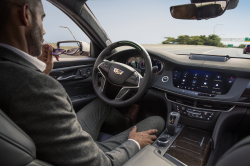
— An advanced driver assistance system (ADAS) may be doing more harm than good, especially in certain driving conditions and situations.
That finding was announced by researchers at AAA who found that in 4,000 miles of real-world driving, advanced driver assistance systems suffered some type of problem an average of every 8 miles.
According to AAA, these test vehicles were gathered directly from the manufacturers or dealerships.
- 2019 BMW X7 (Active Driving Assistant Professional)
- 2019 Cadillac CT6 (Super Cruise)
- 2019 Ford Edge (Co-Pilot360)
- 2020 Kia Telluride (Highway Driving Assist)
- 2020 Subaru Outback (EyeSight)
AAA performed the tests in real-world conditions and in a closed-course setting to determine how well the vehicles responded to common driving scenarios. However, the 2019 Cadillac CT6 and 2019 Ford Edge were evaluated only within real-world conditions.
AAA researchers found the vehicles had trouble with the driver-assist systems trying to keep the vehicles in the correct lane and the vehicles traveling too close to guardrails or other vehicles.
Research indicates lane centering technology is a problem as 73% of performance problems and erratic lane positioning were related to that feature in real-world driving.
In closed-course testing, researchers found the systems had problems with approaching simulated disabled cars, resulting in a crash that occurred 66% of time at an average speed of 25 mph.
The study also found systems that combine acceleration with braking and steering often disengaged with little notice. A disengaged system immediately turns all the driving responsibilities back to the driver, but researchers note the serious dangers if the driver isn't paying attention.
“Active driving assistance systems are designed to assist the driver and help make the roads safer, but the fact is, these systems are in the early stages of their development. With the number of issues we experienced in testing, it is unclear how these systems enhance the driving experience in their current form." - Greg Brannon, AAA director of automotive engineering and industry relations
Researchers also say the reliability of driver assistance systems is a necessary step toward consumers accepting self-driving cars, something most vehicle occupants aren't real excited about.
Multiple studies and surveys show a public scared of automated vehicles, and AAA’s 2020 automated vehicle survey found that only 12% would trust riding in a self-driving car.
AAA researchers say they met with industry leaders about results of the ADAS research and discussed how automakers should limit selling vehicles with driver assistance systems until those systems are more reliable and consistent.




